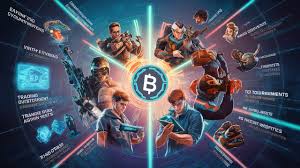
The Shift to Earning Through Gameplay
Play-to-earn (P2E) games are transforming the gaming industry by introducing the concept of earning money through gameplay. Traditionally, gaming was seen as a hobby or pastime, with players spending hours immersed in digital worlds without any financial return. However, P2E games now allow players to earn real-world value—typically in the form of cryptocurrency, non-fungible tokens (NFTs), or digital assets—through their in-game actions. By integrating blockchain technology, these games have created virtual economies where players can earn, trade, and sell assets that have tangible value outside the game. This shift is not only providing gamers with new opportunities for financial gain but is also opening up an entirely new industry for digital entrepreneurs, making gaming a legitimate source of income.
Blockchain Technology Powers the Economy
The key technology behind the play-to-earn model is blockchain, which enables the creation and transfer of digital assets securely and transparently. In P2E games, blockchain technology underpins the creation of cryptocurrencies, NFTs, and other in-game items that can be bought, sold, or traded on external marketplaces. For example, in Axie Infinity, players earn Smooth Love Potion (SLP) tokens by engaging in gameplay, which can be exchanged for cryptocurrency or fiat currency. Similarly, games like Decentraland or The Sandbox allow players to purchase, sell, and trade virtual land and items in the form of NFTs, which can increase in value over time. Blockchain’s decentralized nature ensures that players truly own their in-game assets, creating an environment where these assets are not just virtual tokens but valuable items that players can profit from.
The Emergence of In-Game Economies
As P2E games grow in popularity, they are fostering the development of entire digital economies within gaming ecosystems. In these economies, virtual goods—such as characters, items, skins, or land—hold real-world value, and players can monetize their time, skills, and investments. In The Sandbox, for instance, players can create their own games, design assets, and sell them to other users for real money. Similarly, in Decentraland, players who own virtual land can rent it out, host events, or sell the land at a profit. These in-game economies are rapidly growing and have the potential to rival traditional markets in terms of size and value. As P2E games expand, more developers are creating complex in-game marketplaces where players can earn passive and active income through various means, such as trading assets, mining, or staking tokens.
Democratizing Earning Potential in Gaming
One of the most powerful aspects of P2E games is their ability to democratize earning potential within gaming. Unlike traditional gaming models, where the only way to profit is by being a game developer or a publisher, P2E games offer financial opportunities to anyone with access to the game. This has opened up a new world of possibilities for players from economically disadvantaged regions. In countries like the Philippines, players have been able to earn significant incomes by playing Axie Infinity, which has helped many individuals generate revenue from gaming, even without a traditional job. By simply participating in the game, players can accumulate tokens or NFTs that can be traded or converted into real money, offering a path to financial independence that was once unimaginable for many gamers.
The Future of Profit in Gaming
The future of gaming is poised to be increasingly intertwined with financial opportunities. As P2E games continue to evolve, more innovative ways to earn profit will emerge, with virtual economies becoming more complex and integrated with real-world markets. New developments like the metaverse—the interconnected virtual space where players can live, work, and socialize—are expected to further blur the line between gaming and profit-making. In the future, players may be able to use their in-game assets as collateral for loans, create businesses within virtual worlds, or participate in decentralized finance (DeFi) protocols through gaming platforms. As these gaming ecosystems continue to develop, play-to-earn models will not only redefine the way games are played but also how games are monetized, turning gaming into a legitimate and sustainable source of income for millions of players worldwide.
Join Now & Grab Your Free Spins Bonus!


